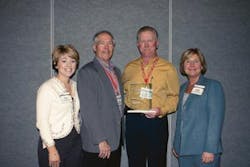Q: How did you get involved in the aviation industry?
A: While in college, I started in the aviation industry as a part-time employee. I started out cleaning aircraft on the midnight shift in Miami. I figured out very early that was not what I wanted to do for the rest of my life and started bidding on other jobs immediately. When I made full-time, I moved over to the ramp and that is where my interest in aviation really grew. On the ramp no two days are exactly the same. You never knew what you would be faced with from day-to-day. I can truly say that from my first day on the ramp I had the aviation bug.
Q: What are the trends you’ve seen in the past 20–30 years?
A: Outsourcing is the biggest thing that has happened by far over the past 20 to 30 years. It started out slowly but has picked up speed in the last 10 years. I attribute that to the cost pressures that have been placed on the airlines. First, it was the legacy carriers that felt the pressure, but today everyone feels it. The problem is that very few of the suppliers that provide outsource services have a successful business model. There is money to be made in this industry if someone would do it right. By right, I mean hiring the right people, providing the necessary training and systems to monitor quality. If someone did it right they would separate themselves from everyone else.
Q: What are some of the biggest challenges you have faced?
A: One of the biggest challenges I faced was forming a centralized group to manage GSE at Delta. Previously every department/station was responsible for management of their own GSE. So, you can imagine the diversity of equipment we inherited. To add to that we also had the GSE from Northeast, Western and Pan Am acquisitions in our fleet. At one time we had 17 different manufacturers of bag tractors in our fleet and after this year we will only have four. We had 68 years of various purchasing decisions to deal with and form a plan going forward.
Q: What do you favor most about working in this industry?
A: From the GSE side it is a relatively small industry and we all know each other. I have been involved in many different sides of the airline business but have never felt the camaraderie that we have in GSE. Most people that have been in this industry for any length of time don’t leave it; they just change companies. There is something that is almost addictive about this industry. I think that it is the variety of issues we deal with that make it exciting. I can pick up the phone and call any one of my counterparts at another airline and we discuss current issues or suppliers. The GSExpo has been a big catalyst for bringing, as George Prill use to say, the “tribes” together. It is a great place to network and catch up with your counterparts while evaluating the latest equipment. I typically meet with other airlines more than I do with suppliers at the Expo. I leave the Expo with a sense of where the industry is heading for the next year.
Q: What changes would you like to see made in the industry?
A: There is a big need for GSE standardization specifications for the passenger airlines. We all have our own specifications of how we want the airline-specific equipment to operate and be manufactured. The end result of this is poor quality, decreased reliability and high maintenance cost. We drive the manufacturer to build multiple versions of equipment when we all use the equipment for the same purpose. I was amazed when one manufacturer told me he had to stock 14 different colors of white for various customers. Most of the differences in equipment specification are driven by our safety organizations and marketing people. We need to get our hands around it so the manufacturer can produce a more consistent and higher quality product.
Q: As a long-term vet, what advice would you give our readers?
A: If you are a person that enjoys a challenge that comes with a considerable amount of pressure, this is the industry for you. This is not the industry it was 20 or 30 years ago, but no industry is. In a global marketplace the customer has a lot of options. Many industries (automotive, steel) have found this out the hard way. If one fails to react to the marketplace, you cease to exist.





